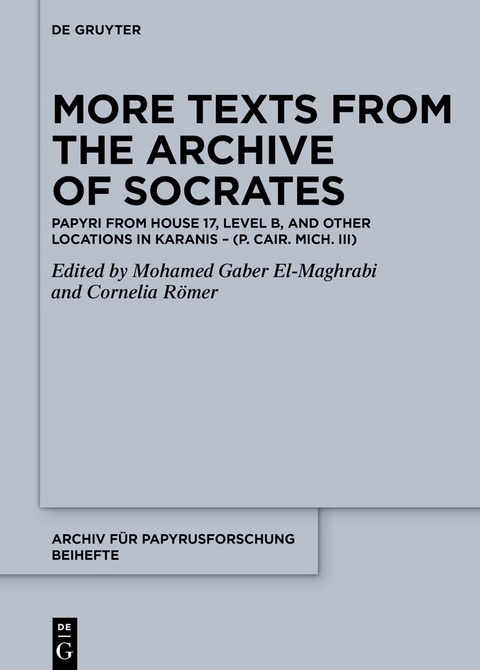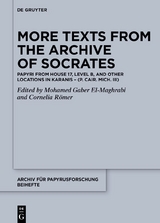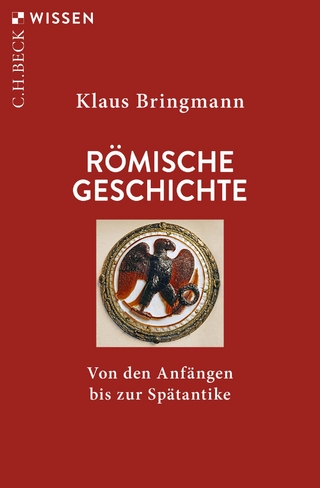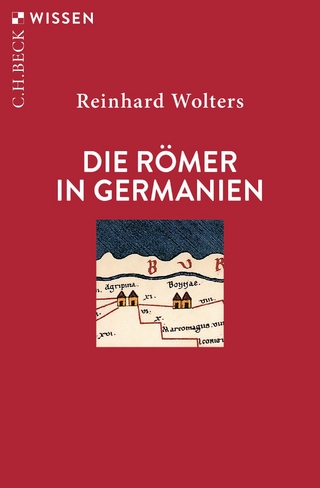More Texts from the Archive of Socrates
Papyri from House 17, Level B, and Other Locations in Karanis (P. Cair. Mich. III)
Seiten
2021
De Gruyter (Verlag)
978-3-11-071428-9 (ISBN)
De Gruyter (Verlag)
978-3-11-071428-9 (ISBN)
Die Zeitschrift Archiv für Papyrusforschung und verwandte Gebiete ist das älteste papyrologische Fachorgan der Welt. Sieunterscheidet sich von anderen papyrologischen Zeitschriften hauptsächlich durch ihre Referate (literarische Papyri, christliche Texte, Urkundenreferat, juristisches Referat, koptische Texte und Urkunden, Demotica Selecta sowie Darstellungen und Hilfsmittel). Die Beihefte zu der Zeitschrift vereinen sowohl Monographien als auch Sammelbände; im Zentrum stehen Neueditionen von Papyrustexten griechischer, lateinischer, koptischer, demotischer oder arabischer Sprache, die neue Erkenntnisse zu verschiedenen Bereichen des Altertums vermitteln: zu Philologie, Literatur, Philosophie, Religion, Politik und Sozialgeschichte, zu Militär- und Rechtsgeschichte, zu Geographie und Landeskunde, zu Schul- und Gesundheitswesen und zum Alltagsleben; kurzum, zur antiken Kulturgeschichte überhaupt.
This volume contains editions of 35 texts, which have been excavated nearly 100 years ago in the ancient Egyptian village of Karanis, and which were still waiting publication. As all texts written on papyrus from the Egyptian countryside, these texts give a new insight into the life of the people who dwelled in a typical village of the Roman period in Egypt. The texts show the cultural diversity of those who cohabitated, whether they had Greek or Egyptian names, whether their main gods were the crocodiles or Zeus. In the lives of all of them tax-paying played an important role, as well as caring for their cattle and fields, doing business, and fullfilling the obligations of the Roman government. In particular interesting is the personage of Socrates the tax-collector. Since the ruins of Karanis are still standing (and worth a visit) with two nearly intact temples from the period of the texts, a more complete image of village life emerges from texts and the archaeology behind them. Papyrologists welcome every newly published text as a further stone of the mosaic image that they try to create of the past.
This volume contains editions of 35 texts, which have been excavated nearly 100 years ago in the ancient Egyptian village of Karanis, and which were still waiting publication. As all texts written on papyrus from the Egyptian countryside, these texts give a new insight into the life of the people who dwelled in a typical village of the Roman period in Egypt. The texts show the cultural diversity of those who cohabitated, whether they had Greek or Egyptian names, whether their main gods were the crocodiles or Zeus. In the lives of all of them tax-paying played an important role, as well as caring for their cattle and fields, doing business, and fullfilling the obligations of the Roman government. In particular interesting is the personage of Socrates the tax-collector. Since the ruins of Karanis are still standing (and worth a visit) with two nearly intact temples from the period of the texts, a more complete image of village life emerges from texts and the archaeology behind them. Papyrologists welcome every newly published text as a further stone of the mosaic image that they try to create of the past.
lt;p>Mohamed El-Maghrabi, University of Alexandria, Egypt and Cornelia Römer, University of Vienna, Austria.
| Erscheinungsdatum | 22.06.2021 |
|---|---|
| Reihe/Serie | Archiv für Papyrusforschung und verwandte Gebiete – Beihefte ; 45 |
| Zusatzinfo | 40 col. ill. |
| Verlagsort | Berlin/Boston |
| Sprache | englisch |
| Maße | 170 x 240 mm |
| Gewicht | 541 g |
| Themenwelt | Geschichte ► Allgemeine Geschichte ► Altertum / Antike |
| Schlagworte | Faiyum Oasis • Karanis • Papyri • Papyrus • Roman Egypt • Römisches Ägypten • village life |
| ISBN-10 | 3-11-071428-0 / 3110714280 |
| ISBN-13 | 978-3-11-071428-9 / 9783110714289 |
| Zustand | Neuware |
| Informationen gemäß Produktsicherheitsverordnung (GPSR) | |
| Haben Sie eine Frage zum Produkt? |
Mehr entdecken
aus dem Bereich
aus dem Bereich
von den Anfängen bis zur Spätantike
Buch | Softcover (2024)
C.H.Beck (Verlag)
12,00 €




